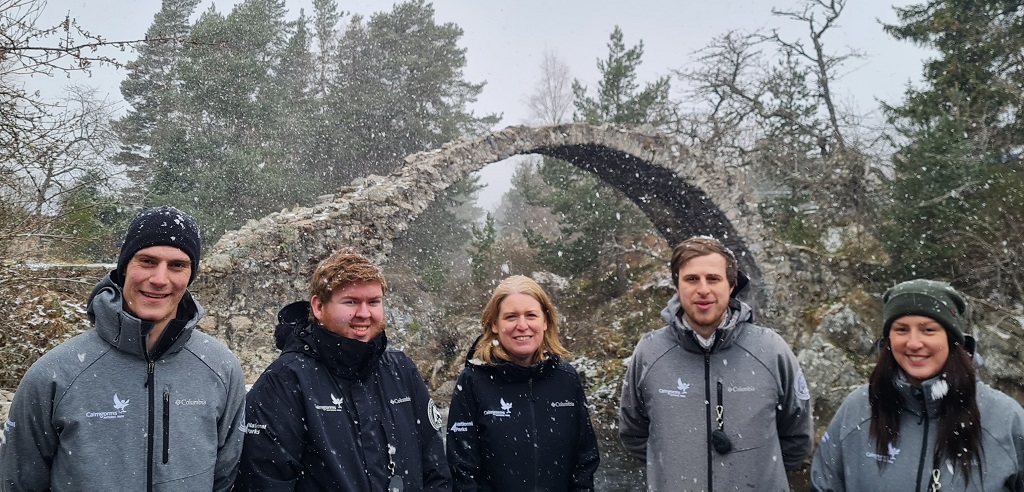It’s almost Easter and that can only mean one thing – not chocolate – the seasonal rangers are back on patrol in the Cairngorms National Park, ready to welcome visitors.
Rangers in the UK’s largest National Park are here to help everyone enjoy their holiday, while safeguarding the area’s special wildlife, landscapes and communities. The team are a regular sight across the Cairngorms National Park but more so in busier areas such as Glenmore, Loch Muick and Lin o’ Dee.
The CNPA has recruited ten seasonal rangers for 2022 with the return of two of last year’s Kickstart rangers. Danny O’Brien and Scott Hastings were part of the UK Government’s Kickstart programme in 2021, with funding available for employers to create job placements and training opportunities for young adults aged 18-24.
Scott said: ‘Being part of the Kickstart programme last summer has been life changing for me. I’ve gone from working as a kitchen porter to working in the outdoors, doing what I love. Being one of the trainee rangers really helped me find my vocation and gave me lots of useful experience, resulting in me being recruited as a seasonal Cairngorms National Park ranger for 2022.’
Joining them are three completely new faces for 2022, Fiona Brewis and Andy Kirk will be on patrol in Deeside, working alongside Vicky Inglis and a third new seasonal ranger, Douglas Carchie, joins Danny and Scott in Badenoch and Strathspey, along with Blair Johnston, Gillian Gibson and Craig Fraser. In the Angus Glens is Tony Sievwright.
Working from Easter to October, looking after this special area and giving advice to visitors, is part and parcel of the seasonal rangers role.
Gillian Gibson says the thing she probably does the most in her job is speak with campers: ‘Camping is a great way to experience all that the Park has to offer so I try to help campers make the most of their time here by explaining how they can help care for the environment with advice on how to stay safe. I also explain why having a campfire is not necessarily a good idea in a National Park and that camping stoves are much better for cooking.’

Fellow seasonal ranger, Blair Johnston – originally from Argyll – added: ‘I feel really at home in the Cairngorms and I hope my passion for the area rubs off on the visitors I speak to and that I am able to help them enjoy the Park to the full. We meet so many people doing this job, all of them keen to do the right thing but they maybe don’t know quite how. Probably the advice I give out the most is around fires – and not having them – and asking people to keep dogs on leads or close to heel in sensitive areas at certain times of the year to protect wildlife.’
The CNPA also employs three full-time rangers and grant aids several other ranger services in the employment of partner agencies and other landowners. This mixed model is proving valuable as well as economical.
CNPA Ranger Manager Lucy Ford explained: ‘There were several ranger services operating in the park when it was established in 2003 so rather than create our own, the decision was taken to grant aid those existing services. Nearly twenty years later and with 40 per cent more visitors coming here, we really need those extra boots on the ground. What we have across the Cairngorms National Park now, is an experienced and highly flexible arrangement where the CNPA can deploy its own rangers where they are needed the most, supporting those partner services.
‘We have an excellent and very experienced team of Seasonal Rangers here – some of them were with us last summer so they know the area and the issues well. Their key roles and responsibilities are to offer a warm welcome to visitors to the Cairngorms National Park, ensuring people have the necessary information to have an enjoyable and safe time. This helps to provide some reassurance to land managers and communities that the CNPA is extremely committed to ensuring that everyone stays safe.’
A seasonal ranger service was established for the first time in 2020 in response to the high numbers of visitors coming to the Park after the first Covid-19 lockdown was lifted. Infrastructure improvements such as extensions to carparks and path improvements made last year, particularly at ‘hotspot’ areas like Glenmore in Strathspey and Loch Muick in Deeside, is also helping manage visitor pressures.
For more information on enjoying the Park responsibly visit HERE.
TAGS

